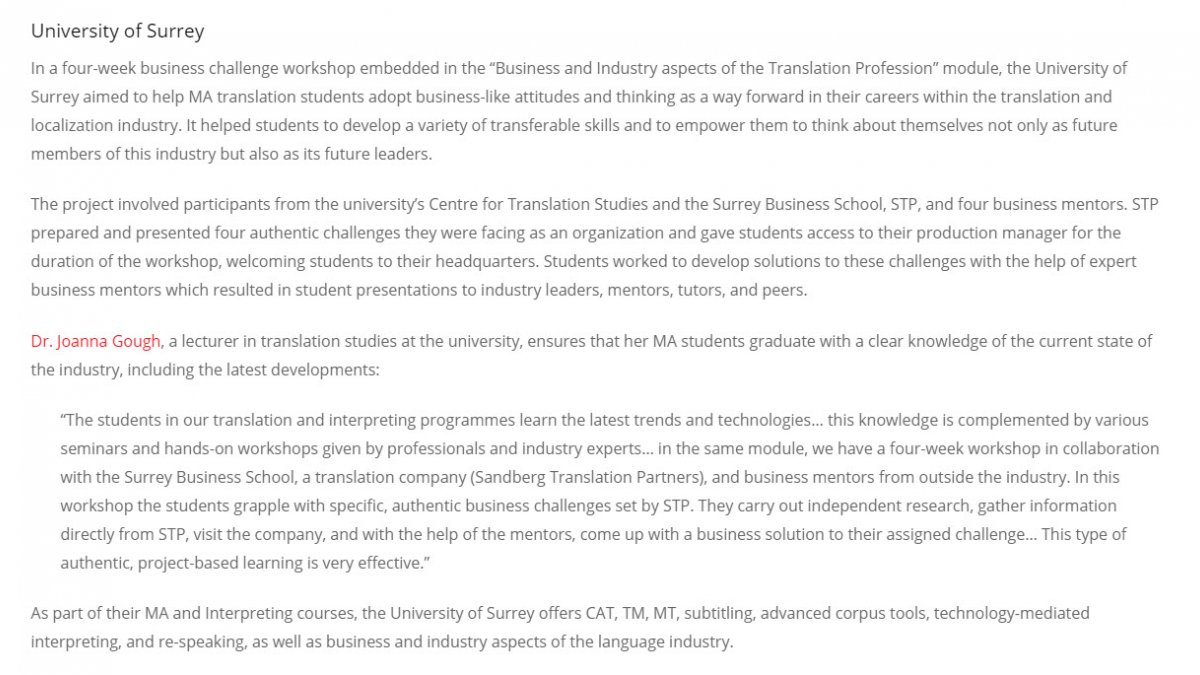
Dr Joanna Gough
Academic and research departments
Centre for Translation Studies, Literature and Languages, Faculty of Arts, Business and Social Sciences.About
Biography
Joanna holds an MA in English Philology from Adam Mickiewicz University, Poland and an MA in Translation from University of Surrey. In 2016 she completed her PhD in the area of information behaviour of professional translators. Shortly after that she was appointed as a Lecturer in Translation Studies at the University of Surrey. Joanna’s research interests encompass a variety of language and technology related subjects, such as tools and resources for translators, process oriented translation research, technology supported collaborative translation and many more. With an interest in the business and industry aspects of the translation profession she is a keen advocate of cooperation between academia and industry. Joanna is a member of the ITI Professional Development Committee and a LocLunch Ambassador.
Areas of specialism
University roles and responsibilities
- Industry liaison
- Professional Engagement Portfolio
- CTS Seminar Series
- Employability and Careers Fair
My qualifications
Affiliations and memberships
I have been a member of the ITI PDC for the last 10 years and have helped with the development of the CDP provision and writing for the ITI publications.
I hold an academic ITI membership.
News
In the media

ResearchResearch interests
Collaborative translation on commercial translation platforms
Translation technologies and their impact on translation process
Individual differences and translator styles
Process-oriented translation research
Information behaviour and translation-oriented research activities
Human-computer interaction in translation
Research interests
Collaborative translation on commercial translation platforms
Translation technologies and their impact on translation process
Individual differences and translator styles
Process-oriented translation research
Information behaviour and translation-oriented research activities
Human-computer interaction in translation
Supervision
Postgraduate research supervision
PhD Supervision:
Gu, Yi - English to Chinese Corpus - Design, Analysis and Application
Singureanu, Diana - The role of Emotional Intelligence in renegotiating the virtual space in videoconference based remote interpreting
Firat, Gökhan - Collaborative and Cooperative Translation in the Digital Economy
Teaching
Teaching:
- Business and Management in Translation
- Academic Research Methods
- Principles and Challenges of Translation and Interpreting
- Introduction to the Translation Profession
- Introduction to Translation Methodology
- Multilingual workshops
- Dissertation seminars
Other responsibilities:
- Academia - language industry liaison
- Professional development / Employability
- Professional Engagement Portfolio
- Careers Fair
- CTS Seminars
Publications
Highlights
Gough, J., Temizoz, Ö., Hieke, G., Zilio, L. (2023). Concurrent Translation on Collaborative Platforms. Translation Spaces. John Benjamins Publishing Company. DOI:https://doi.org/10.1075/ts.22027.gou
The technologisation and industrialisation of the translation process, together with the growth and expansion of the internet, and, recently, AI technologies, have had an impact on translation practice and, consequently, on the way translators carry out their translation-related research. This necessitates a response from the research communities to examine this impact and the ensuing changes in translation practice, with translator training and the development of relevant competences being one of the biggest considerations. This paper reports on a study of the research activities of 16 freelance professional translators during a translation task in their natural working environment. It examines patterns associated with these activities with regard to the nature of resources, research direction and research strategies adopted by the participants and the distribution of research activities within a translation task. It reports on findings relevant to translator training in terms of competences associated with information acquisition and utilisation during the translation process to inform the development of these competences. More specifically, a spectrum of the translator resource behaviour as well as patterns of research distribution are identified, highlighting their relevance for the changing nature of the translation process in new technological environments. New areas of interest for translator trainers are suggested, including diversification of student practice with regard to search strategies and the use of external resources, distribution of research phases, as well as raising awareness of how technological innovations may impact translation-oriented research activities.
This article studies the effects of automating a job allocation system, in a translation company of approximately 130 employees. Perceptions of the effects of automation on roles and responsibilities were collected through a short survey, answered by 38 project managers and translators. This evolved to an analysis of effects on the deeper notion of professional responsibility, related to accountability, control, engagement and understanding of a translation workflow. The results first reflect on positive and negative effects of automation, notably indicating that automation can both restrict and enhance professional roles and autonomy. The focus then turns to perceptions of workers’ main responsibilities, when impacted by a new automated process. One key result suggests increased difficulty in prioritising these duties. Furthermore, translators prefer not being restricted by their specialisations and favour the development of new skills. Another relevant finding of the study shows in-house translators as being the group who alludes more frequently to concepts related to responsibility. The article contributes to the study of socio-technical changes in the translation industry, suggesting that responsibility plays an important part in highlighting the effects of technology, not only on professional and organisational practices, but also on individual perceptions of accountability and job satisfaction.

